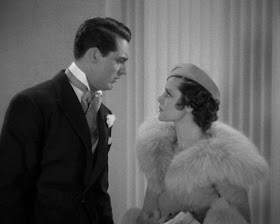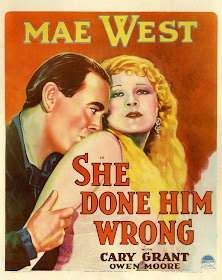THIS IS THE NIGHT
1932 - ***
Lily Damita in some righteous satin black gowns and perennially mussy hair is the big would-be star in this early Lubitsch-esque Paramount gem. Charlie Ruggles provides the bulk laughs as the travel agent pal of rich Parisian homewrecker (and perennial short square) Roland Young, who's been courting married woman Thelma Todd. We can certainly understand why he would fall for Todd, but considering her husband is an Olympic team javelin-thrower played by Cary Grant (in his feature debut), we must ask, for god's sake woman, art thou insane? Of course Grant was still just coming into his own, as a featured Paramount romantic co-star in 1932. Guys like Young and Ruggles managed to steal most of the lines while Grant just smoked and smirked and--in this case--came home early from his trip, singing along with the Lubitsch-by-way-of-Mamoulian-imitation symphonie of naughty Paris nightlife opener right as old Mr. Ruggles is leaving train tickets for Venice outside their apartment. Think fast, Ruggles! The stage is set for a roundelay of French boudoir farce; Grant thinks they're for him and Thelma which means Young needs to find a girl as a beard so he has an excuse to follow her, for he's so smitten. Porters sniff the girl's luggage as they load it, with little train dings to signify intoxication d'parfume. And jealous Young hires a girl to pose as his own mistress so he can have an excuse to stalk after his beloved Thelma. It's Lilly Damita he settles on.
Nothing goes according to plan, naturally, but Grant at least seems to love playing the suspicious husband, barely deigning to pretend--for the sake of decorum--to buy the shorty's terrible hem-hawing excuses, but he's always ready to be amused and patient while they trip themselves up, mug and sweat before him. It's all tripe, sure, but the timing's expert; the Hollywood Venice recreations are lovely, but the night outdoor scenes in and above the canals are tinted deep blue and too dark to see clearly. As Young's beard, Damita's hair is thick and shaggy; her accent endearing but Garbo-ed; her spirit fiery but inconsistent, the romantic ending assured but belabored. TCM's restoration rich and lovely, which is important as there's not much to hold onto. But no matter, it's pure undistilled Paramount and though it never rises to anything like sophistication, it's still adorably winky like sparkly champagne. Todd's weight fluctuates from shot to shot and makes us wonder if she was secretly pregnant under all those wraps, and Damita makes a decent impression as an innocent waif struggling to feign a Dietrich-Garbo-esque worldly sophistication atop her Lupe Velez firebrand Latina sass. The more Grant, smitten, is convinced she's really Young's girl, the more furious Todd gets. Ordering him to send her away, he complies like a whipped dog, perhaps indicating that's the issue she has with Grant. Todd wants a guy she can tease, manipulate, and bully in ways a javelin thrower just wouldn't go for. But if Young thinks he's getting laid with either of them, dream the fuck on.
PS - This same boilerplate plot would be used again with most of the same actors in another Paramount production, KISS AND MAKE UP (with Horton subbing for Young) and again by Billy Wilder in KISS ME, STUPID (with Ray Walston subbing for Grant). Kiss and make me up, Stupid! I can't stand watching dweebs like Ray Walston and Roland Young get jealous of the women they hire to pretend to be their wife so they can steal someone else's girl or stop someone else from stealing their's. It's sleazy and uncouth and, what's worse, not French.
KISS AND MAKE-UP
1934 - ***
"Don't you know that ugliness is a disease?!"
Cary Grant is a Parisian plastic surgeon / 'cosmetician' / beauty spa impresario who gets a steady stream of high wallet women through his palatial parlor (Warren Beatty in SHAMPOO is a eunuch by comparison) as devoted and 'decent' secretary Helen Mack fumes in the background and disgruntled husbands continually sneak in with the help of a plumber disguise that the plumber rents to them outside, by his truck. Long tracking shots with direct-to-camera staring / POV action as hotties in various stages of undress greet our good doctor on his strolls through his Apollonian beauty temple. The farce angles heat up once the action moves to the Riviera, where Grant's prize patient, Eve (Genevieve Tobin) threatens to get fat "in all the wrong places" unless he sleeps with her. In order to preserve his masterful handiwork, Grant makes a tremendous sacrifice: he marries her and then finds her cockblocking him with all his own beauty tips, even sabotaging his career while she debates which outfit to wear. Oh the humanity! And by the time she's all ready for bed, bedecked in gross oils and plastic gloves, she's a sexual purgative.
Horton as her previous cuckolded husband has a great monologue about the hell of dating a too-beautiful woman, and he's right, it is hell. Helen Mack might change all that though with her modest Maureen O'Sullivan-style straight shooterhood (when she gets mad you can hear some of that Brooklyn accent that comes out so strongly as Molly Malone in His Girl Friday) --Horton gets to her on the rebound, and they sing a duet: "Corned Beef and Cabbage, I Love You." Man, Horton sure got a lot of sweet, smart, capable and sexy young girls nearly to the altar before guys like Grant, Cooper or March woke up to the flaws of their flashier diva-du-jour. Meanwhile Grant also gets a chance to sing--"Love Divided by Two," twice! These songs stick out like sore thumbs... and I like that. Grant was still just a fledgling star at the time, a Paramount arm candy hustler with a music hall trill in his singing voice. Meanwhile, a sheik brings his harem in to see Grant --they go in as old depressed old Muslim women and come out as El Morocco flappers. Sublime, quintessentially Paramount moments like Grant huffing ether and tipping his top hat while covered in rabbits during the car chase finale, or a great dissolve between a champagne and the splash of the beach resort surf make up for the shallowly bourgeois anti-beauty polemic aspect of the source material (it's based on a play). Find it in the Cary Grant - Screen Legends Collection DVD.
SHE DONE HIM WRONG
1933 - ****
This one has passed the Erich acid test: the black and white air is thick and breathable, the death hangs in the air -- vice and despair are never more than a breath away, and Mae's sense of humor is a warm beacon in a jet black galaxy.
SECRETS OF THE FRENCH POLICE
1933 - ****
RASPUTIN AND THE EMPRESS
1932 - **1/2
MGM pulled out the Eisensteinian stops for this exercise. The FAIL SAFE to the Von Sternberg's SCARLET EMPRESS STRANGELOVE, it's a fascinating and detailed look at a huge chunk of Russian history relatively unrepresented in Hollywood - the years preceding the WWI-revolution, with Rasputin caught trying to make it with the sexy young sister of the hypnotized czar. MGM goes all out with moody lighting schemes and Lionel Barrymore knows how to work a lantern in the dark to really amp up the evil lechery. But man, how much better it would be if Lionel had switched roles with brother John, who's more or less wasted as the straight man? Was Rasputin too much like Svengali, who John played so ham-finitively the year before at Warners? Meanwhile sister Ethel Barrymore is pretty underused, looking the most hungover, which is saying a lot. And what an awesome and underrated movie SVENGALI was, much better than this, which is a little too talky, too many scenes of the royal court looking with unease at the million-strong peasant protests. And Anastasia is even in it, pre-revolution and before getting lost in the chaos and then turning up dazed in White Russian ex-pat circles all over Paris, as we saw in SECRETS OF THE FRENCH POLICE.
PS - The real life version of John Barrymore's character was still alive in 1932 and successfully sued MGM for defamation, and that's why that "resemblance to living or dead" blurb was ubiquitous from then on, even in biopics. Thanks for teaching me that, Robert Osborne! I like to imagine granddaughter Drew Barrymore as the czsar's little sister, thus completing the family portrait. But for all that, a much better film about the Barrymores, if you can find it, even though no Barrymores are in it, is THE ROYAL FAMILY OF BROADWAY.










Fabulous reviews. If we're talking early 30's Rasputin-themed films, I cannot recommend the German film, RASPUTIN DER DEMON DER FRAUEN, enough. Conrad Veidt is so perfect and it is surprisingly racy, but also more intelligent than the title would let on.
ReplyDelete